100% Chinese Enough
Kristina Cho reveals the hardest part of making her latest book—and shares a low-effort, high-reward salmon recipe.
One of the best parts of my job as food director at REAL SIMPLE is compiling my yearly list of favorite cookbooks. I post the story in June with books from the first half of the year and update it in December with books from the second.
I’m going to be honest, I spend too much time on this list. But, bosses, if you’re reading this, don’t worry! Most of that is off the clock, as I spend evenings and weekends preparing meals/snacks/bakes at home from every book I’m considering. I’m not convinced every, or even most, list-compilers do this. Books I’ve desperately wanted to include fell off the round-up because one of the recipes didn’t work.
Kristina Cho’s most recent book, Chinese Enough (Bookshop/Amazon), was a shoe-in. Aside from featuring recipe after recipe that I want to cook, it also has a point of view, a reason for being.
Let’s start with the point of view. In the introduction Kristina writes about growing up in the suburbs of Cleveland, feeling neither Chinese nor American enough, begging her mom to pack “normal” lunches. That in-betweenness became the springboard for this book. She writes that, as an adult living in California, she finally developed her own style of cooking:
“…an amalgamation of all my culinary influences to date. It was distinctly Chinese, with generous Midwestern hospitality and practicality, and a sunny Californian approach to ingredients. As I cooked more and more, the contrast that I had once felt between being Chinese and being American slowly softened.”
The resulting book is both deeply personal and broadly appealing, kind of a magical combination.
Now onto the recipes. The book is broken up into eight charmingly named chapters, including “Best with Rice,” “You’ll Always Have Noodles,” and “I Love You, Here’s Some Fruit.” I keep going back to three recipes we absolutely adored, the Roast Salmon with Sambal Vinaigrette (I made this for Stephanie Lau’s Cookbook Club celebrating Chinese Enough, and it was a hit!), the truly better than take-out Wispy Mushroom Chow Mein, and the Crispy Brussels Sprouts with Sriracha Mayo, finished with a flurry of furikake. The recipe for the Roast Salmon is below.
Thank you Kristina for talking cookbooks with me! Check out her Substack and follow her on IG.
The Cookbookery Q&A with Kristina Cho
About how many cookbooks do you own?
KC: Give or take 150.
How do you organize them?
KC: I keep a small collection in the bookshelf nook in my kitchen, which is a mix of cookbooks I constantly reach for or new ones that help provide a boost of inspiration while I'm working. The rest are in my office and they are organized by the color of the spine, not totally because of aesthetics, but because I genuinely remember books by their spine color and it's easier for me to locate them that way.
How did Chinese Enough come to be?
KC: A few months after submitting the manuscript to my first book [the James Beard Award-winning] Mooncakes and Milk Bread (Bookshop/Amazon), I had a particularly inspiring meal at my parents home in Cleveland. It was December 2020, so it was a pretty stressful year, and it had been a very long time since I had my parents’ cooking. I watched as the two of them casually made a four-course Chinese home cooked meal in less than an hour. There was steamed rice, winter melon and tofu soup, tomato egg, and stir-fried mussels with black bean and garlic sauce. I was in awe and instantly reminded of why I love to cook so much. I wanted to capture this spirit of cooking in a book.
What was the hardest part about making the book?
KC: Honestly, coming up with a title. It's one of the hardest parts of any book-creating process. The title changed a few times, and I didn't come up with Chinese Enough until closer to the end of manuscript writing. I was a little nervous to pitch it at first and worried if my editor would get it, but she did and it stuck. I love that it's a little cheeky but also quietly powerful. It represents the food in the book so well.
What kind of cookbook reader/user are you?
KC: I prefer cookbooks that you actually want to read, so if one is compelling enough I will read it from cover to cover. I want to know why the author loves this recipe so much and why cooking their recipe will improve my day.
What do you find boring in a cookbook?
KC: When the recipes are ones you could easily find online and without any real creative intervention. I think cookbooks are special and the recipes within them should be different and interesting enough to deserve a moment memorialized in print.
What is a cookbook that changed the way you cook?
KC: One is Grandma Grandpa Cook (Bookshop/Amazon) by Yeung Yang & Evelyna Liang. It not so much changed the way I cooked but how I thought about cookbooks and the potential they have to document lives and cultures. It's a collection of recipes from 40 grandparents, but what's remarkable about it is that the book is written in both English and Chinese. The recipes are very old school as you could imagine and the stories are beautiful, funny, and sometimes heartbreaking.
What is a cookbook that totally transports you?
KC: Aloha Kitchen (Bookshop/Amazon) by Alana Kysar absolutely takes me to my friend's warm and tropical backyard and the table is complete with spam musubi, mac salad, and grilled galbi short ribs.
What is a cookbook that you find supremely useful?
KC: Tartine Bread (Bookshop/Amazon) was the first book that got me hooked on sourdough. Making sourdough is so simple, but the way most people write about it makes it sound a lot more precious and complicated than it should be. The way it breaks down the process really works for my brain. It's also a beautiful book and I look to it for all forms of practical baking advice.
What is a cookbook that you find supremely beautiful?
KC: Betty Liu’s My Shanghai (Bookshop/Amazon). She captured life and food in Shanghai so beautifully and the same goes for all the food she made in her home kitchen.
What is the last recipe you made from a cookbook?
KC: The Buckwheat Chocolate Chunk Cookies from More Than Cake (Bookshop/Amazon) by Natasha Pickowicz. It's a perfect cookie in my opinion.
What is one thing you’re proud of about Chinese Enough?
KC: I shot all the food photos in the book within a month in the midst of a home renovation. I don't recommend this. The intention was to move back into our house when the kitchen was done so I could shoot the book with a brand new kitchen, but then the time came for us to move in; there were no counter tops or running water. My photos were due in a month. I quickly asked a few of my friends that had nice-ish kitchens and good lighting if I could spend a few days in their homes cooking and shooting. So what's captured in the book are my dishes made under imperfect conditions, which is closer to how people in the real world would make them. They weren't made in a studio kitchen with a whole team of stylists and photographers. Just me, my friends and family, normal kitchens.
Interview has been lightly edited. If you purchase a book through one of these links, I may receive a small commission.
More to Nibble On
Book announcements from Dan Pelosi and Klancy Miller
Happy pub week to Kwéyòl/Creole, Third Culture Cooking, and Dinner by Meera Sodha.
Planning recipes for my cookbook club this weekend; we’re cooking from Hot Date! and the forthcoming Sesame. I’ll post pix on Insta!
If you missed last week’s interview with Zoë François, you’ll want to check it out. She revealed the topic of her next cookbook, and I can’t wait for it.
Welcome to Substack Everything Cookbooks!
Circling back to cookbook titles…what’s one that you think is especially apropos, clever, or evocative? I nominate Salt, Fat, Acid, Heat; Roast Figs and Sugar Snow, and Nothing Fancy. Tell me your picks in the comments!
Recipe from Chinese Enough: Roast Salmon with Sambal Vinaigrette
A fillet of salmon, even in its simplest form, has a way of wowing a crowd, but it looks especially beautiful topped with a tangle of watercress and crisp cucumbers dressed in a sambal vinaigrette. Farm-raised salmon has a higher fat content than wild salmon, so it needs to cook longer. Because of the fat content and the thickness of a salmon fillet, you’ll finish the salmon in the oven after the skin gets crispy so it’s perfectly cooked through. If you only have smaller portions of salmon (individual fillets) or are using wild salmon, it will cook much faster, so consider omitting the step of finishing the salmon in the oven. Instead, after the skin is crispy, simply flip the fish over and cook until cooked through, which takes only 2 to 3 minutes more.
Serves 4 to 6
1½ pounds (681g) salmon fillet, skin-on, scales and bones removed
1 teaspoon kosher salt
½ teaspoon ground white pepper
1 tablespoon extra-virgin olive oil
¼ cup (60 ml) freshly squeezed lime juice
2 tablespoons sambal oelek
1 tablespoon honey
2 cups (90 g) watercress
1½ cups (130 g) thinly sliced Persian cucumber
2 tablespoons Fried Garlic (page 310)
Steamed rice, for serving
WARM UP: Preheat the oven to 400°F (204 °C).
SEAR THE SALMON: Season the salmon with the salt and white pepper. In a large oven-safe skillet, heat the olive oil over medium-high heat. Immediately (before the pan gets too hot) place the fish in the pan, skin-side down, and sear until the skin is crispy and naturally releases from the pan, 6 to 7 minutes. Transfer the pan to the oven and bake until the fish is cooked through, 8 to 10 minutes.
MEANWHILE, MAKE THE VINAIGRETTE: In a medium bowl, whisk together the lime juice, sambal, and honey.
PLATE AND SERVE: Transfer the fish to a serving platter and pour half the vinaigrette over the fish.
In a large bowl, combine the watercress and cucumber. Pour over the remaining vinaigrette and toss to combine. Place the greens over the salmon and sprinkle the fried garlic over the greens. Serve with rice.
Excerpted from Chinese Enough by Kristina Cho (Artisan Books). Copyright © 2024. Photographs by Kristina Cho.


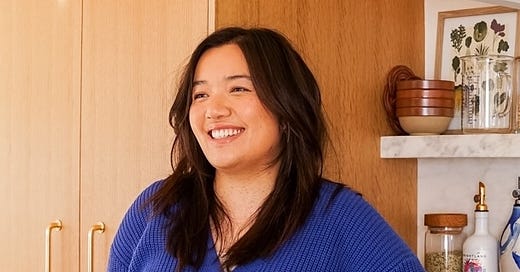


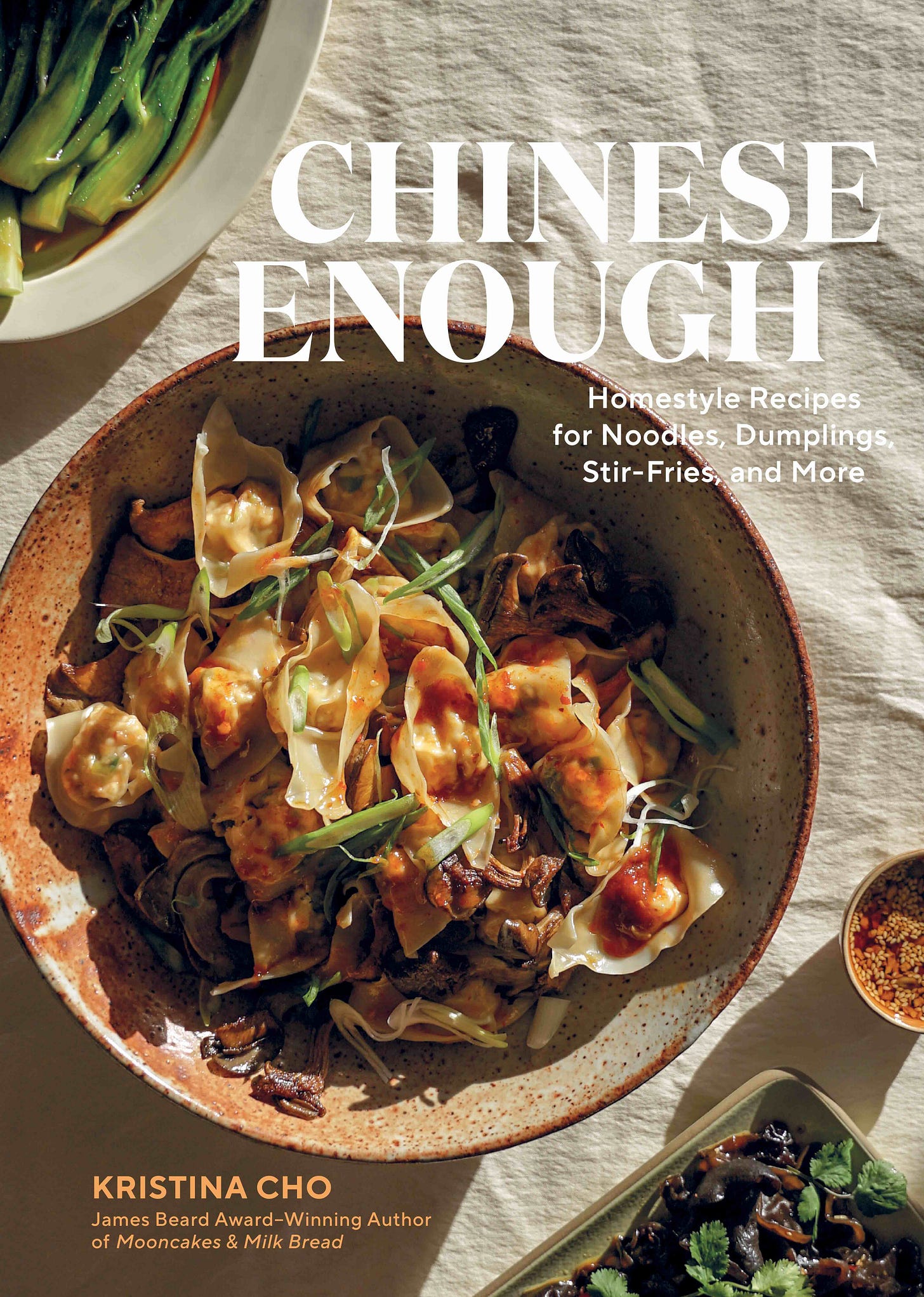

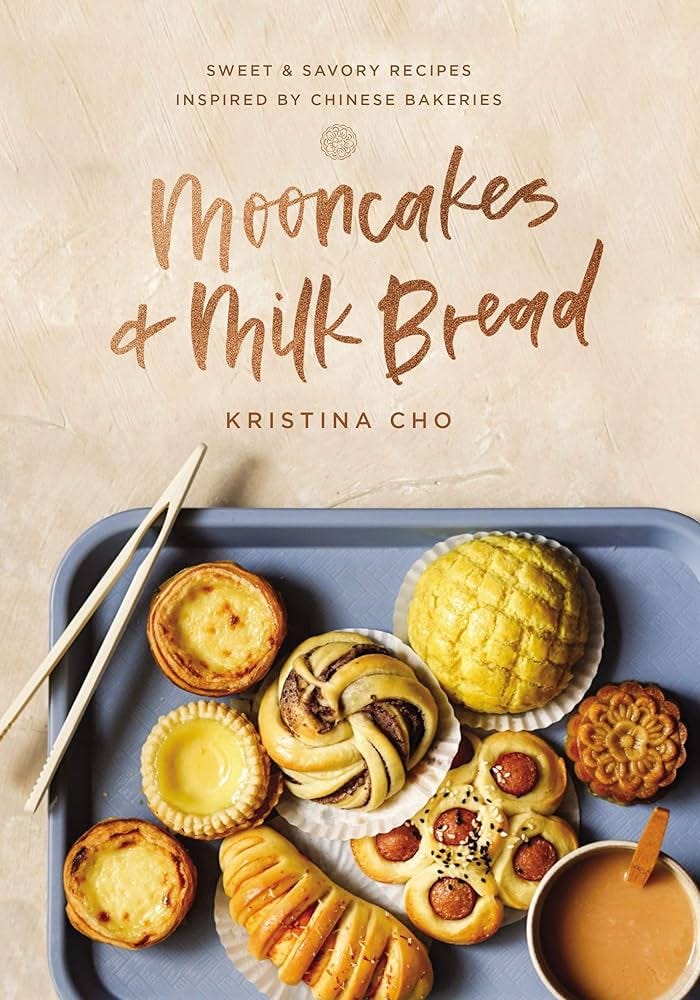
![Aloha Kitchen: Recipes from Hawai'i [A Cookbook]: Kysar, Alana: 9780399581366: Amazon.com: Books Aloha Kitchen: Recipes from Hawai'i [A Cookbook]: Kysar, Alana: 9780399581366: Amazon.com: Books](https://substackcdn.com/image/fetch/$s_!7nj0!,w_1456,c_limit,f_auto,q_auto:good,fl_progressive:steep/https%3A%2F%2Fsubstack-post-media.s3.amazonaws.com%2Fpublic%2Fimages%2F5be22b09-9c82-46b3-b8dc-e9a54a13bc3c_1986x2560.jpeg)
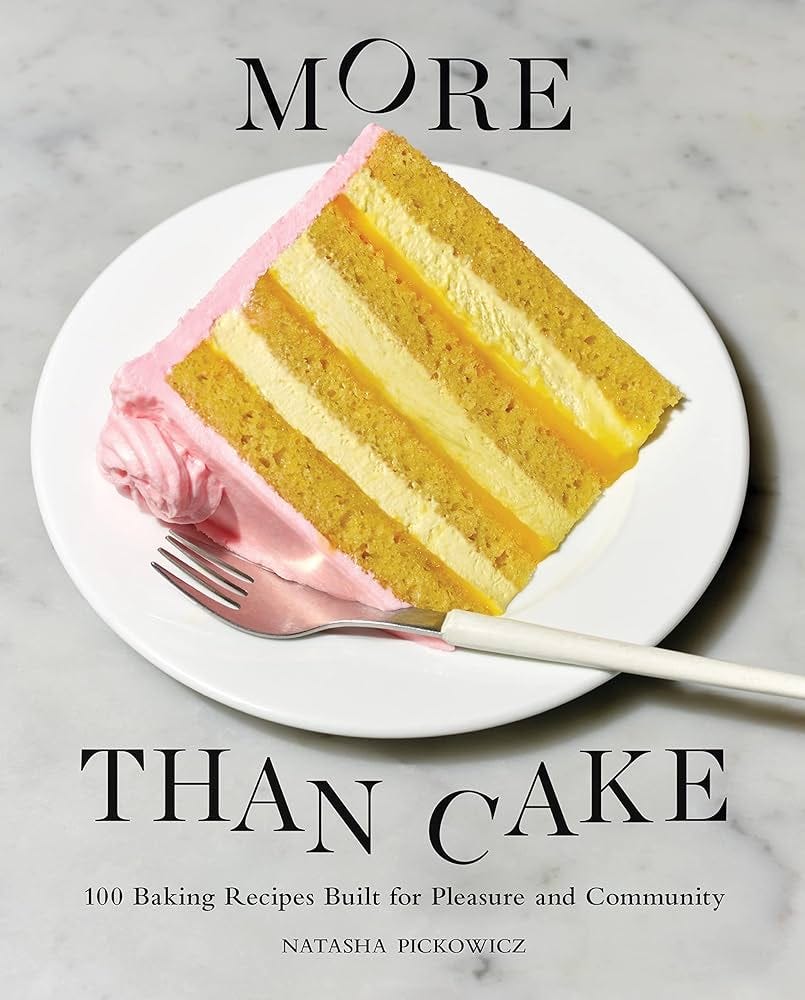
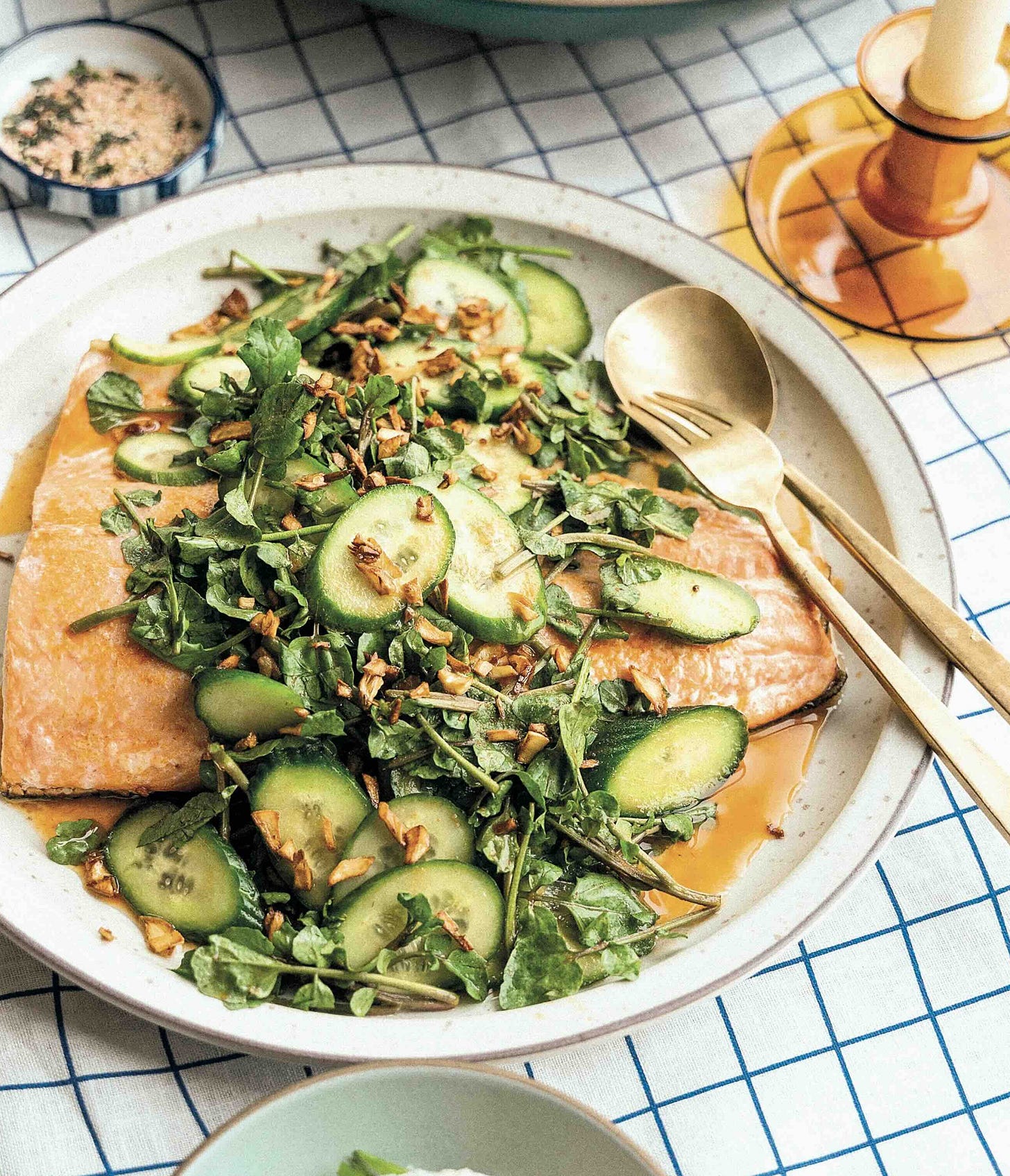
Kristina's title and every interview I've read about her book capture me! I love all these interviews, especially what each author considers their indispensable cookbooks.
I love hearing how books come to be and this one seems extra special. It’s also so refreshing to feel the rigor in which you really dig into each book!